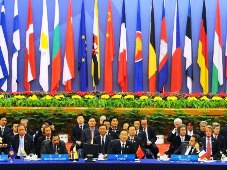The recent meeting of G20 finance ministers in Washington agreed to set up a surveillance system to monitor the economic performance of countries with the greatest potential for "spillover effects" - the economic impact that extended beyond their boundaries. The list is expected to include the US, China, Japan, Germany, Britain, France and India. The surveillance system will eventually be extended to all G20 members.
The list is expected to include the US, China, Japan, Germany, Britain, France and India. The surveillance system will eventually be extended to all G20 members.
The criterion for deciding the composition of the first list was economic size. All seven countries contribute at least 5 per cent to G20's total output.
The economic indicators that will be continually monitored include fiscal deficits, public debt, trade imbalances and net investment incomes and flows.
A set of statistical methods and structural approaches has been devised to provide warning signals if one or more indicators are at or above danger levels.
This is a well-intentioned exercise, which is designed to be pre-emptive in nature. Early warnings and remedial action would prevent global meltdowns as witnessed in 2008-09, triggered by the sub-prime crisis in the US.
As is now well-known, the US financial system had taken on an unacceptably high level of risk, whose ramifications continue to be felt globally.
Two other concerns, staggeringly high public debt in the US and the UK and China's rapidly increasing trade surplus, are perpetuating global imbalances.
Ideally, the monitoring system by identifying emerging problems would nip them before they spiralled out of control.
It is not clear how effective this system would be in terms of mandating economic behaviour and imposing sanctions in the event of non-compliance, especially with respect to the bigger economies.
How, for example, will the system be able to bring fiscal discipline to the US or greater transparency in exchange rate management to China?
More importantly, how much latitude would the system provide member countries in formulating policy measures that they deem to be in their best interests when there is no one-size-fits-all economic theory to offer solutions to diverse economies?
It took a huge loss of credibility for sovereign rating agencies like Standard & Poor's to muster the courage required to name and shame the US, as it has done this week.
India's inclusion in the elite list resonates with its own perception of an economic power that has arrived.
The finance ministry's Index of Government Economic Power (IGEP), the measure of a government's ability to project itself in the international sphere, ranked India fifth among 112 countries for which this index was computed.
The variables used to construct the IGEP are government revenues, foreign currency reserves, exports of goods and services, and human capital. Barring human capital, the other three variables are the barometers of a nation's economic health on which the proposed monitoring system will keep an eye.
While issues of high fiscal and current account deficits (both as a proportion of GDP) are a matter of concern, it will behove India to respond positively to the early warnings that the new system would provide.
India could then formulate policy responses that it thinks are in its best interests. Responding to the "red flags" with alacrity would go beyond averting crises.
A robust Indian economy could actually generate positive spillovers, globally.







